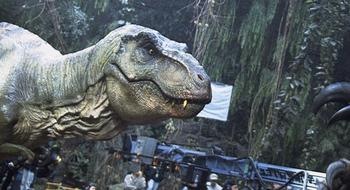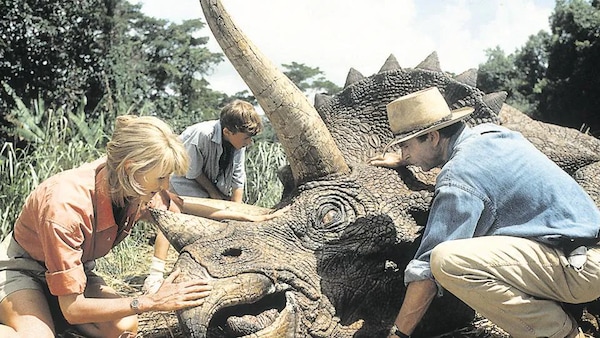Steven Spielberg's Jurassic Park revived the 'science' of palaeontology
The film inspired several books, documentaries and series with major characters playing the roles of palaeontologists like Ross Geller in FRIENDS. We, of course, cannot forget all the banter about dinosaurs!

Jurassic Park
Last Updated: 12.01 PM, Nov 12, 2021
Even though the 1993 film Jurassic Park was not completely historically accurate or had rigorous scientific depictions, it did create quite a massive impact that even the director Stephen Spielberg could not have imagined. The film, inspired by the palaeontologist Jack Horner, led to a golden age for palaeontology. The film series is said to have inspired many to take up research in science with generations of students across the globe taking up the role of dinosaur hunters. Probably, that's what inspired Ross Geller in the American comedy sitcom FRIENDS too.
In today's golden age of palaeontology, a new species of dinosaurs are being discovered every ten days. One of the 'Jurassic Park' generation palaeontologists Benjamin Burger writes in his blog: "Well to say, it (the film) had an influence on the science of palaeontology today, is an understatement." Also, a professor, he had written about how the film impacted the students, growing up with Jurassic Park, having fallen in love with dinosaurs because of this movie, including its sequels, video games, toys and television shows. The make-believe film franchise where dinosaurs take over the land after they are developed with some kind of technology sure has taught something about dinosaurs. The film has changed the science of palaeontology, not only the research about dinosaurs but also the study of all fossilized creatures and plants that lived in the past aeons of Earth’s long history of over 4.5 billion years.

With the Great Depression of the 1930s, palaeontology science became a dying subject of interest as there was an advent of technology after the World War. In the 1950s and 60s, it is said that palaeontologists were not included in the high table of science along with evolutionary biologists. It affected the funding for the field. Much concentration was on genetics and palaeontology was considered old fashion during the period. It was later in 1990 when Michael Crichton's book Jurassic Park inspired the film of the same name that, it can be safely said, the interest in the field of science was revived.
The film inspired many books for both children and adults with an increase in demand and interest for knowledge about dinosaurs. It created a revolution of sorts with many series and documentaries with major characters as palaeontologists, from Friends to the BBC show Walking with Dinosaurs. It made the field of palaeontology 'cool' again, making new students pursue a career in the field. There has been a spike in the number of research papers being published on dinosaurs and other fossils.
The number of enthusiasts at museums increased after the film was released in 1993. Though it was not the first time that dinosaurs were portrayed in films, it garnered a much bigger response, creating a record of highest-grossing film at that time until the record was broken by James Cameron's Titanic featuring Leonardo DiCaprio and Kate Winslet. The film inspired many museums to exhibit dinosaurs after an increased public awareness of the extinct species. The Spielberg movie starred Sam Neill, Laura Dern, Jeff Goldblum and Richard Attenborough. Set on the fictional island of Isla Nublar, near Costa Rica, the film revolves around a wealthy businessman John Hammond and his team of genetic scientists who develop a wildlife park of de-extinct dinosaurs. But an industrial accident leads to a catastrophic shutdown of electricity at the park endangering the lives of a group of visitors and Hammond's family. How they escape and survive with these creatures who take over the land is the crux of the story.
The film was especially praised for its special effects, acting, music and direction. On its 20th anniversary, the makers released a 3D version of the sci-fi film and made it the oldest film to cross $1 billion in ticket sales. It is considered a landmark film due to its CGI and visual effects. It won more than 20 awards including three Academy Awards for its technical achievements in visual effects and sound design. The film spawned several sequels. The latest instalment of the film franchise, the fifth, directed by Colin Trevorrow, is scheduled for a release in 2022.
Relive the pre-historic era of dinosaurs watching the film now available on Netflix.

